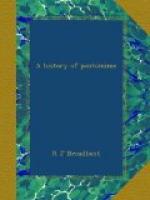Simon. Faith, dress him how you will.
I’ll give him
That
gift, he will never look half scurvily enough.
Oh!
the Clowns that I have seen in my time,
The
very peeping out of one of them would have
Made
a young heir laugh, though his father lay a-dying;
A
man undone in law the day before,
(The
saddest case that can be) might for his second
Have
burst himself with laughing, and ended all
His
miseries. Here was a merry world, my masters!
Some
talk of things of state, of puling stuff;
There’s
nothing in a play like to a Clown,
If
he have the grace to hit on it, that’s the thing
indeed.
Away
then, shift; Clown, to thy motley crupper.
In the praeludium to Goffe’s “Careless Shepherdess,” 1656, quarto, there is a panegyric on them, and some concern is shown for the fool’s absence in the play itself, while it is stated that “The motley coat was banished with trunk-hose.” Yet in Charles II.’s reign, some efforts were made to restore the character. In the tragedy of “Thorney Abbey, or the London Maid,” 1662, 12mo., the prologue is delivered by a fool, who uses these words:—“The poet’s a fool who made the tragedy, to tell a story of a king and a court, and leave a fool out on’t, when in Pacey’s, and Sommer’s, and Patche’s, and Archer’s times, my venerable predecessours, a fool was alwaies the principal verb.” Shadwell’s play of “The Woman Captain,” 1680, is perhaps the last in which a regular fool is introduced; and even there, his master is made to say that the character was exploded on the stage. In real life, as was formerly stated, the professed fool was to be met with at a much later period, but the custom has long been obsolete.
What I have said of the Mysteries of Religion plays will, I hope, be sufficient to show the reader how they were associated with Pantomime. The Moralities, founded on the Mysteries, were the means used to inculcate, by the aid of a slight plot, religious truths without directly using scriptural or legendary subjects. Malone says of them:—“I am unable to ascertain when the first Morality appeared, but incline to think not sooner than the reign of Edward IV. (about 1460). The public pageants of the reign of his predecessor were uncommonly splendid, and being then first enlivened by the introduction of speaking allegorical personages, properly and characteristically habited, naturally led the way to these personifications, by which Moralities were distinguished from the simple religious dramas called Mysteries.”
The Interlude, that was the progenitor of English
Comedy, next arrived.
The origin of the Interlude is credited to John Heywood.
It is interesting to note that a play, entitled, “Gammer Gurton’s Needle,” is credited with being our first English Comedy, though its humour and wit, it is stated, is of a low and sordid kind. Others make claim for the comedy, “Ralph Roister Doister.”




